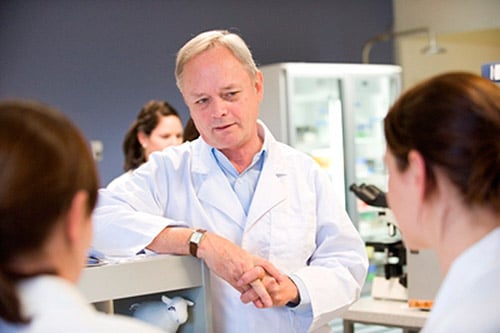
University of Newcastle reproductive expert John Aitken is hoping to stem abortion rates among the next generation of Australian women by developing a female contraceptive that paralyses sperm and protects from sexually transmitted diseases.

Laureate Professor John Aitken is developing a new sperm-paralysing contraceptive.
University of Newcastle reproductive expert John Aitken is hoping to stem abortion rates among the next generation of Australian women by developing a female contraceptive that paralyses sperm and protects from sexually transmitted diseases.
To date, Laureate Professor Aitken* has proven that the compound works in a test tube and has no toxic effects. He has also shown that it prevents the transmission of chlamydia.
The compound in said to be unique in that it is activated only on contact with semen. It doesn’t kill sperm but targets what enables it to swim.
“Our motivation is to reduce the amount of abortions, which are predominantly in under-19s,” Professor Aitken said. “I regard abortion as not a moral failure but a contraception failure. We just don’t have the right methods to empower women to control their fertility.”
Laureate Professor Aitken said that a fifth of pregnancies in Australia were aborted, resulting in about 70,000 terminations a year.
The trial compound is said to be safer for women.
“If you go to a chemist now and buy a spermicide, what you are buying is a detergent that was invented in the 1940s,” Laureate Professor Aitken said.
It’s called Nonoxynol-9 … and women who use it are more prone to getting HIV, not less prone, because of the damage the stuff does to their reproductive tract.”
Professor Aitken’s research also focuses on other aspects of reproduction, including male infertility. Last Sunday he addressed a public forum in Sydney titled “Making Babies in the 21st Century”.
“We have this strange dichotomy between people who are desperate to have pregnancies and those who are aborting their pregnancies,” he said.
“We need to understand this headlong rush into ART [assisted reproductive technology] is going to have a long-term impact on the health and well-being of future generations.
“Any woman who is going to put off having babies until after they’re 35 in the hope that IVF will rescue them are going to be drinking from the well of disappointment.”
* Professor Aitken is Acting Pro Vice Chancellor of the University of Newcastle and Director of the Priority Research Centre for Reproductive Science. He is a member of HMRI’s Mothers and Babies Research program. HMRI is a partnership between the University of Newcastle, Hunter New England Health and the community.
HMRI would like to acknowledge the Traditional Custodians of the land on which we work and live, the Awabakal and Worimi peoples, and pay our respects to Elders past and present. We recognise and respect their cultural heritage and beliefs and their continued connection to their land.

Hunter Medical Research Institute
We’re taking healthy further.
Locked Bag 1000
New Lambton
NSW, Australia, 2305



This site is protected by reCAPTCHA and the Google Privacy Policy and Terms of Service apply.
Copyright © 2024 Hunter Medical Research Institute | ABN: 27 081 436 919
Site by Marlin Communications
